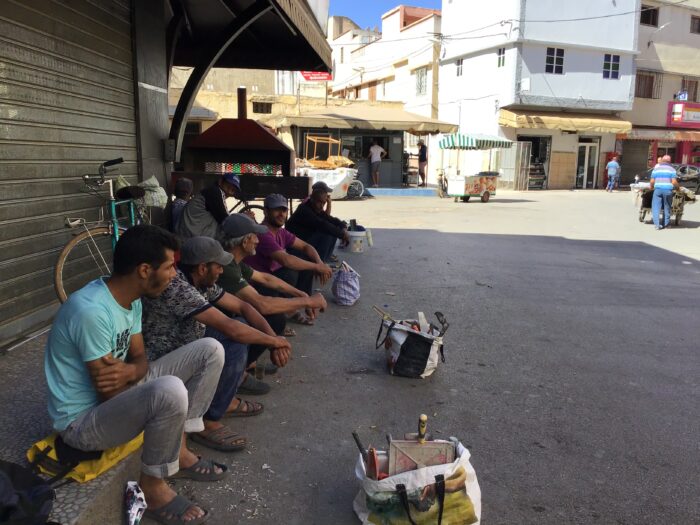On February 13, the government unveiled its action plan to revive employment in 2025, a program backed by 14 billion dirhams. In response to the sharp rise in unemployment, which now affects more than 1.6 million Moroccans, this roadmap aims to address labor market challenges linked to economic, social, and climate transformations.
Presented by Younes Sekkouri, Minister of Economic Inclusion, Small Business, Employment, and Skills, the plan is based on a “participatory approach” involving productive and social sectors, as well as employers, notably through the General Confederation of Moroccan Enterprises (Confédération Générale des Entreprises du Maroc, CGEM).
Between the low productivity of the economy, the mismatch between training programs and market needs, and the inefficiency of government initiatives, unemployment is soaring. In response, the government is relying on an ambitious roadmap for 2025, backed by a 14-billion-dirham budget… pic.twitter.com/iWC3b0nOgq
— TelQuel (@TelQuelOfficiel) February 20, 2025
The program is built around three key pillars: supporting investment to encourage small and medium-sized enterprises to create jobs, restructuring active employment programs to include non-graduates, and introducing a new initiative targeting rural populations through income-generating projects. Additionally, measures are planned to combat school dropout rates, better structure training pathways, and establish governance based on labor market data analysis. The entire framework will be overseen by an interministerial committee chaired by the head of government.
While the ambitions of this roadmap are commendable, it has nonetheless raised concerns among experts, including two economists interviewed by TelQuel.
The lack of structural solutions
“These initiatives are not misplaced; they are welcome. But are they truly up to the challenge when it comes to unemployed youth?” questions Omar Kettani, economist and professor at Mohammed V University in Rabat.
According to official statistics from the High Commission for Planning (Haut-Commissariat au Plan, HCP), Morocco has one million young people without diplomas, ten million illiterate individuals, and approximately 1.6 million unemployed people. However, Omar Kettani argues that these figures underestimate the reality: “Of course, we need to at least double this figure for a more accurate estimate, as 200,000 job seekers enter the labor market every year. So, we can estimate that there are at least three million unemployed.”
The economist questions the relevance of the programs in place and argues that investments should be accompanied by appropriate training. This must be done after first determining who should benefit from them and how they should be structured. The integration of young people, he adds, must be “comprehensive and multidimensional.”
Currently, Morocco has 120,000 prisoners. Once released, “can they reintegrate into the job market, or will they reoffend and end up back in prison?” he asks. He then suggests: “The army, as the ultimate nationalist institution, could play a role in reintegrating some of these young people, particularly former inmates.”
For the expert, integration cannot be reduced to a simple roadmap. “That term is meaningless. A roadmap implies a predetermined path, but that’s not the case here,” criticizes Omar Kettani. He further explains: “We must start by structuring vocational training with hundreds of specializations and schools adapted to different trades. Without that, we don’t have a true integration program—just a superficial management of the problem.”
An opinion shared by Riad Mekouar, economist and professor at the Faculty of Legal, Economic, and Social Sciences in Casablanca. According to him, “Employment policy cannot simply be decreed. It is not a short-term cyclical policy but a long-term structural policy. It only makes sense when considered alongside other structural policies, such as industrial and agricultural policies.”
He stresses the need to ensure coherence between these structural policies and the objectives of employment policy. “These policies must take into account the realities of the labor market, particularly the exact profile of job seekers. It is therefore absolutely necessary to conduct an assessment and analyze the reasons behind the failure of previous policies to avoid repeating them.”
« A general psychological collapse »
Government decisions seem to be driven by urgency and social pressure rather than a well-thought-out strategy, says Omar Kettani. “The current government is a government of merchants, not industrialists, let alone experts in social investment,” he adds. He highlights “the lack of a comprehensive vision, which only fuels skepticism.” The strategy, he argues, is “reactive and short-term, dictated by public opinion, which perceives the worsening situation.”

And he questions: “The situation goes beyond the social framework; it is a general psychological collapse. Do those in charge truly understand this?” The economist emphasizes that “youth unemployment has both psychological and economic impacts.” Even without jobs, “these young people still consume, but often in harmful ways. They remain dependent on their families and may fall into drug or alcohol abuse, or even engage in illegal activities. The risk of marginalization is enormous, especially with such discouraging prospects.”
“The problem is no longer merely economic; it is becoming social and psychological”
Omar Kettani believes the situation is becoming critical, as evidenced by the increasing number of street vendors, informal car guards, and illicit cigarette sellers. “These phenomena are alarming signals. We are also witnessing a rise in assaults in certain areas, making access to some neighborhoods more dangerous. The problem is no longer merely economic; it is becoming social and psychological.” He also points to the growing prevalence of mental illness as a further indication of this crisis.
For his part, Riad Mekouar emphasizes that “the issue of employment is crucial” and concludes: “It requires genuine social dialogue, political courage, and a strong capacity for listening on the part of government officials.”
Written in French by ElMehdi El Azhary, edited in English by Eric Nielson




